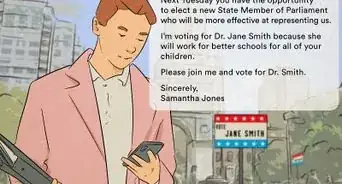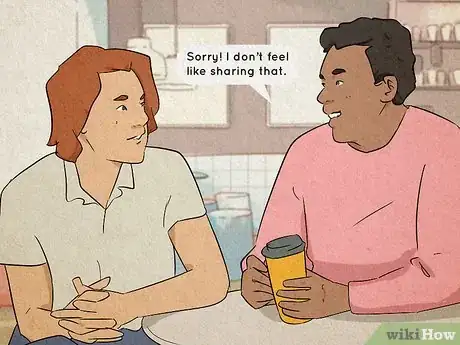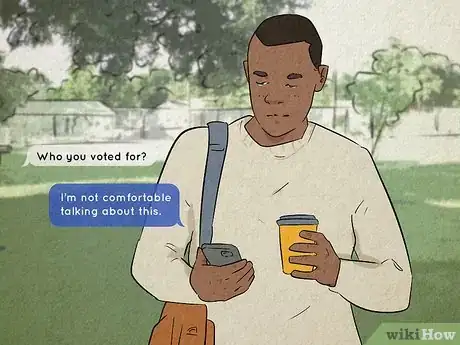This article was co-authored by John Keegan and by wikiHow staff writer, Janice Tieperman. John Keegan is a dating coach and motivational speaker based in New York City. He runs The Awakened Lifestyle, where he uses his expertise in dating, attraction, and social dynamics to help people find love. He teaches and holds dating workshops internationally, from Los Angeles to London and from Rio de Janeiro to Prague. His work has been featured in the New York Times, Humans of New York, and Men's Health.
This article has been viewed 5,797 times.
Dealing with the dreaded “Who did you vote for?” question from friends, family, or coworkers? It can be challenging to navigate this difficult subject without being put in the hot seat. Don’t worry, though—we’ve got you covered. Keep reading plenty of ways to both answer and sidestep this pesky question in any conversation you may encounter it.
Steps
“I’d rather not answer that question.”
-
Honesty is the best policy in an uncomfortable conversation. Be upfront and explain that political questions make you uncomfortable and that you’d much rather avoid the topic. Hopefully, the other person will get the hint and talk about something else instead.
- “I don’t feel comfortable sharing that at work.”
- “Sorry, but I’m not a fan of political conversations.”
“Wouldn’t you like to know?”
-
Deflect their question with a question of your own. With just a simple question, you end up turning the tables on the other person and putting them in the hot seat.[1] X Research source
- “I don’t feel comfortable sharing that with you.”
- “Respectfully, I don’t feel like answering that question.”
“I don’t remember.”
-
A quick joke gets you a quick exit from the conversation. Saying “I don’t remember” is a quick but effective way to let other people know that the topic is off-limits for you. Plus, it might even get you a few laughs![2] X Research source
- “Wow, the election was, like, a full day ago. I don’t remember who I voted for!”
- “I barely remember what I did this morning, let alone who I voted for yesterday.”
“Do you mind if we change the subject?”
-
This is a blunt but kind way to hint that you aren’t interested in sharing. Redirect the conversation to a different topic, like your co-worker’s children or your friend’s weekend plans. This way, you can continue the conversation without talking about any unpleasant, uncomfortable topics.[3] X Research source
- “Did you catch that TV episode last night?”
- “I’m not really in the mood to talk politics. What are your plans for the rest of the week?”
“I’ve decided not to share who I voted for.”
-
Offer this neutral response to friends, co-workers, and strangers alike. You don’t need to give any extra explanation if you don’t want to, but you’re welcome to provide a reason if you’d like. [4] X Research source
- “I’ve decided not to talk politics this year. It stresses me out and isn’t good for my mental health.”
- “Sorry! I don’t feel like sharing that.”
“I didn’t even tell my partner who I voted for.”
-
Use this quip to escape questions from acquaintances and strangers. Setting such a huge baseline kindly but firmly reminds other people that they aren’t entitled to any of your private information and political leanings.
- “No offense, but I don’t even tell my sister who I voted for.”
- “Yeah, I don’t tell anyone who I vote for. Not even my best friend knows.”
“I don’t want to discuss that at work.”
-
This is a great way to exit any unpleasant workplace conversations. Your top priority at work needs to be… well, work! Political sidebars won’t help you check anything off your to-do list, and it’s important to remind your co-workers that your work comes first. Say something like:
- “I’m really swamped today. I don’t have time to talk about that kind of stuff.”
- “I really don’t want to talk about politics at work. Besides, I have a lot of stuff I need to get done by the end of the day.”
“With the current political climate, I’d rather not get into it.”
-
Play to other people’s empathy with this reply. Political tensions are high in a lot of different countries, and it’s perfectly natural to want to keep your political thoughts and opinions at arm’s length. This excuse lets the other person know that it’s nothing personal, and that you don’t want to unnecessarily rock the boat. Here are a couple of things you might say:
- “Nothing personal, but I’d rather keep my vote to myself. The voting climate is absolutely crazy right now, and I don’t feel comfortable talking politics.”
- “I’d rather not get into it. This political climate is toxic enough as it is.”
“I don’t feel like answering that.”
-
No one is entitled to your voting history. Use this quick response to shut down any co-workers, acquaintances, or strangers who are trying to dig into your business. With any luck, they’ll get the hint and drop the subject.
- “If you don’t mind, I’d rather not answer that.”
- “I don’t feel like answering that right now, sorry.”
“I don’t see how my decision affects you.”
-
Shut down persistent people with this clear answer. Sharing your vote now certainly won’t change the impact of the election, and it won’t change who the other person voted for, either. Point out the error in their logic by saying:
- “They already called the election. I don’t see why you need to know who I voted for.”
- “How does knowing who I voted for impact you?”
“My vote isn’t any of your business.”
-
Set a clear boundary if the person keeps bothering you. You deserve your privacy, and no one is entitled to know who you voted for or what your political affiliations are. Make it clear that you don’t appreciate their questions, and that you don’t intend on answering them.
- “I’m not comfortable talking about this. My vote really isn’t your business, and I ask that you respect my privacy.”
- “Respectfully, who I voted for is none of your business. Please stop asking me about it.”
“I voted for the candidate I hoped would win.”
“I voted for _____.”
-
You might feel comfortable chatting with someone who shares your political beliefs. By talking with someone like-minded, you don’t have to worry about launching into any unpleasant political debates. If anything, you can vent about your frustrations in a healthy way, like:
- “Wow, this election is really stressing me out.”
- “I’m really nervous for the next 4 years after this past election.”
You Might Also Like
 What's the Difference between a Governor and a Senator?
What's the Difference between a Governor and a Senator?

-Step-1.webp)










 How to Win a Local Election
How to Win a Local Election
References
- ↑ https://ideas.ted.com/5-scripts-to-help-you-deflect-nosy-questions-stop-advice-givers-fend-off-criticism-and-more/
- ↑ https://www.lifecoach-directory.org.uk/memberarticles/dealing-with-difficult-behaviour-nosey-people
- ↑ https://nyprojecthope.org/managing-uncomfortable-conversations-during-the-holidays/
- ↑ https://www.psychologytoday.com/us/blog/fulfillment-any-age/201506/9-ways-handle-nosy-people
About This Article






















-Step-1.webp)



































